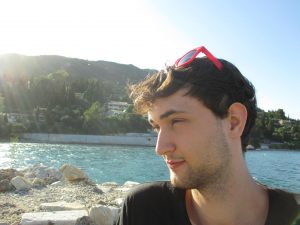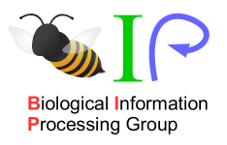Project: Decoding of calcium signals

In many cell types calcium ions function as second messengers, carrying information on extracellular stimulants. Some of these stimulants do not only cause a short rise in the cytosolic calcium level, but provoke oscillations. It was found, that dependent on the stimulus kind and abundance different oscillation waveforms are observed. Oscillations may vary in their amplitude, frequency, duration, or general shape (for instance, “spikes” characterized by one rapid peak or “bursts” characterized by an initial rapid peak followed up by several minor ones).
According to experimental observations, proteins activated by calcium are sensitive to specific oscillation characteristics – calcium’s oscillation frequency being perhaps the most researched one. Among the proteins found to be frequency-selective in their calcium-dependent activation are for example calcineurin, calpain, CaMKII, NF-AT, NF-kB and protein kinase C.
I apply theoretical models as well as models built to mimic specific calcium-dependent proteins to research frequency-decoding. By means of deterministic as well as stochastic simulations, I aim at clarifying the underlying mechanisms.
Stochastic methods generate realistic fluctuations in abundance levels, that in their randomness can be considered as an antagonist of reliable information transfer, similar to transmission noise in a technological communication channel. Further building on parallels drawn from communication sciences, molecularbiological cascades can be viewed as channels, too. For the system of interest, calcium’s oscillation frequency is defined as respective channel’s input, that is read by a decoder protein. The protein’s concentration, that changes in response to stimulation with calcium, is defined as the output. Employing principles of information theory, information transfer through the defined channel can be quantified in the presence of realistic amplitudes of noise.
Teaching
- R-programming course for biologists and molecular biotechnologists
- supervision of interns
Publications
- Arne Schoch. OscillatorGenerator – a CRAN (R-project) package for the generation of parameterizable, discrete time series of various oscillation shapes. https://CRAN.R-project.org/package=OscillatorGenerator (2018)
- Arne Schoch, Jürgen Pahle, “Requirements for band-pass activation of Ca2+-sensitive proteins such as NFAT”. Biophysical Chemistry (2018), doi:10.1016/ j.bpc.2018.10.005
Funding and supervision
This study is funded by BIOMS (Center for Modelling and Simulations in the Biosciences). Supervision is granted by Dr. Jürgen Pahle and Prof. Ursula Kummer (both Heidelberg University, BioQuant).
Contact information
Room number: 442
Email: Arne.Schoch[at]bioquant.uni-heidelberg.de
Phone: +49-(0)6221-5451328

